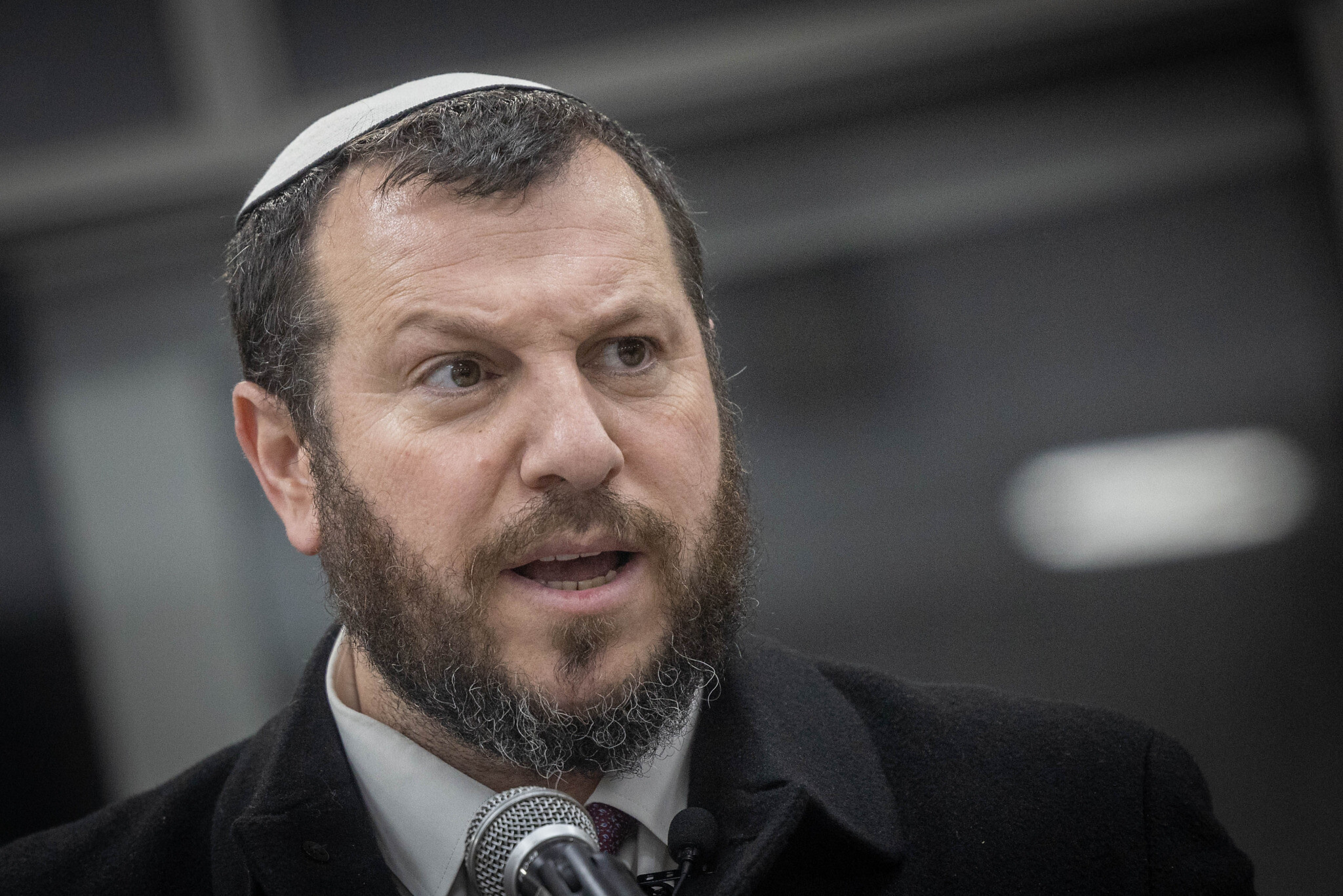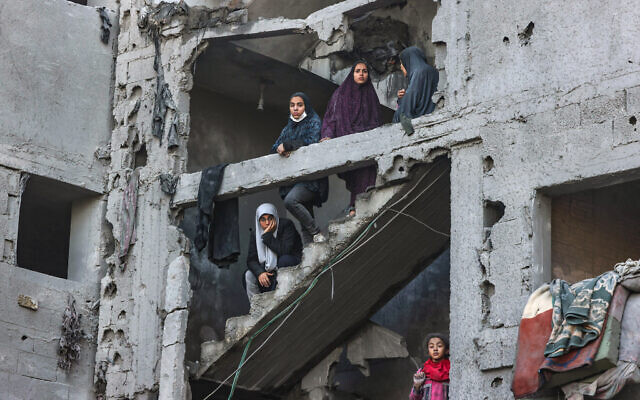



Pushing back against American pressure to revive a long moribund peace process, Heritage Minister Amichai Eliyahu warned this week that US President Joe Biden “is leading us to a disaster.”
Speaking to The Times of Israel in his Knesset office on Monday, Eliyahu, a member of the far-right Otzma Yehudit party, explained that while he was grateful for everything the Biden administration has done for Israel since October 7, he believes that the establishment of a Palestinian state next to Israel “would lead to a holocaust.”
“I want to say thank you to the United States and the Biden administration for all of their support,” but “Biden is making a very big mistake,” he declared, asserting that US support for establishing a Palestinian state when an overwhelming majority of Palestinians “support the barbaric massacre” shows that “terror pays and will get you what you want.”
A December 2023 poll found that 57 percent of respondents in Gaza and 82% in the West Bank believed Hamas was correct in launching its onslaught, in which some 1,200 people in Israel, mostly civilians, were murdered and over 240 were taken hostage.
“What kind of racism is it on our part that we don’t believe what [the Palestinians] say,” he asked.
Eliyahu’s comments came weeks after his party leader, National Security Minister Itamar Ben Gvir, harshly criticized the Biden administration’s handling of the war in Gaza in an interview with The Wall Street Journal in which he argued that Israel would have been better off dealing with a second Trump administration.
Since October, the Biden administration has broadly supported Israel’s declared war goals of dismantling Hamas and bringing home the hostages, vetoed UN Security Council resolutions seeking to impose a permanent ceasefire, fast-tracked the sale of hundreds of millions of dollars worth of munitions to Israel, bypassing congressional review, and delivered hundreds of planeloads of military equipment.
At the same time, however, Washington has emphasized what it sees as the importance of a reformed Palestinian Authority ultimately governing Gaza along with the West Bank, and urged Israel to open a pathway to a Palestinian state.
Aside from raising the specter of another Jewish genocide if the establishment of a Palestinian state were to go ahead, Eliyahu used similar language to object to efforts to limit Ben Gvir’s demand for restrictions on Muslim access to the Al-Aqsa compound atop the Temple Mount during Ramadan.
“How legitimate is it that there is a complete month during which Jews are afraid,” he asked, apparently referring in particular to the events of 2021 when violence between Jews and Arabs broke out in many mixed cities following clashes at the Jerusalem holy site.
It’s like something from “the previous century, from the 1930s. Don’t forget that we are not yet 100 years from the Holocaust,” Eliyahu said, calling on the government to avoid “surrendering” to threats of violence.
Eliyahu has a history of contentious rhetoric, including accusing Israel’s security chiefs of “rebelling” against the current coalition, calling anti-government protesters “evil” and dubbing Bank of Israel governor Amir Yaron a “savage.”
More recently, he sparked international outrage by claiming that dropping a nuclear bomb on the Gaza Strip was an option, a statement called “detached from reality” by Prime Minister Benjamin Netanyahu.
This statement was later cited by South Africa in a motion accusing Israel of genocide before the International Court of Justice, prompting Eliyahu to later brag that “even in The Hague they know my position.”
Asked if he regretted talking about potentially using nuclear weapons in Gaza, Eliyahu insisted that the interviewer had put words in his mouth.
“They asked me if I’m in favor of nuclear weapons and I said we have to find what hurts them and will cause them to stop,” he said, dismissing concerns that his words were being used by Israel’s enemies to bolster claims of genocidal intent.
Despite his own and other Israeli politicians’ oft-heated language, Eliyahu said he believes that most of his colleagues, on the right and the left, “are good people” who are concerned with the interests of the nation.
This includes Netanyahu, who despite “many disagreements” is a leader who works so hard that he “doesn’t sleep at night,” Eliyahu continued. He dismissed calls in some quarters for early elections — despite his own party’s previous threats to bolt the coalition.
Turning to the cabinet’s difficulty in formulating a plan for the “day after” hostilities end in Gaza, Eliyahu said that while he was “worried” that “there is no agreement” on future steps, the government’s internal arguments were a sign that Israel is a healthy democracy.
After months of fighting in the Gaza Strip, as of Monday’s interview, the government had yet to articulate a clear outline for how it plans to avoid finding itself maintaining a lengthy reoccupation if and when it defeats Hamas, which has ruled the coastal enclave since 2007.
While Netanyahu’s hard-right coalition allies have called for the reestablishment of Jewish settlements and the “voluntary emigration” of Palestinians, others, like war cabinet member Minister Benny Gantz, have said that Israel will retain “0% civilian control” in Gaza.
For his part, Eliyahu — the son of Safed Chief Rabbi Shmuel Eliyahu and grandson of late Sephardic Chief Rabbi Mordechai Eliyahu — lashed out at the international community for objecting to both voluntary Palestinian emigration and renewed Israeli settlement of Gaza.
“The whole world can absorb millions of refugees, but doesn’t allow refugees from Gaza to go elsewhere; they don’t want to help free them from the war and the rule of Hamas,” he said. As for reviving settlements, he said: “Where there is settlement, there will be security.”
“You don’t speak to people from weakness. And it’s preferable to return to settlements than to war and killing,” he added.
On Thursday, several days after Eliyahu’s comments, Netanyahu presented his cabinet with a brief policy document outlining his vision for a postwar demilitarized Gaza whose civil administration would be placed in the hands of “local officials” following the implementation of a “de-radicalization process.”
According to Netanyahu’s outline, “the rehabilitation plan will be financed and led by countries acceptable to Israel,” a statement at odds with many of the countries seen as potential donors.
Eliyahu dismissed some Arab states’ policy of conditioning financial and political support for the postwar reconstruction of Gaza on the advancement of a US-backed initiative toward a two-state solution, predicting that while there would be some initial friction, they would eventually come around to assist in reconstruction efforts.
Recalling how it took some of Israel’s neighbors decades to accommodate themselves to Israel’s existence, Eliyahu declared that “in the end, when we are certain of our path, the world will be convinced.”
Jacob Magid and Times of Israel staff contributed to this report.



